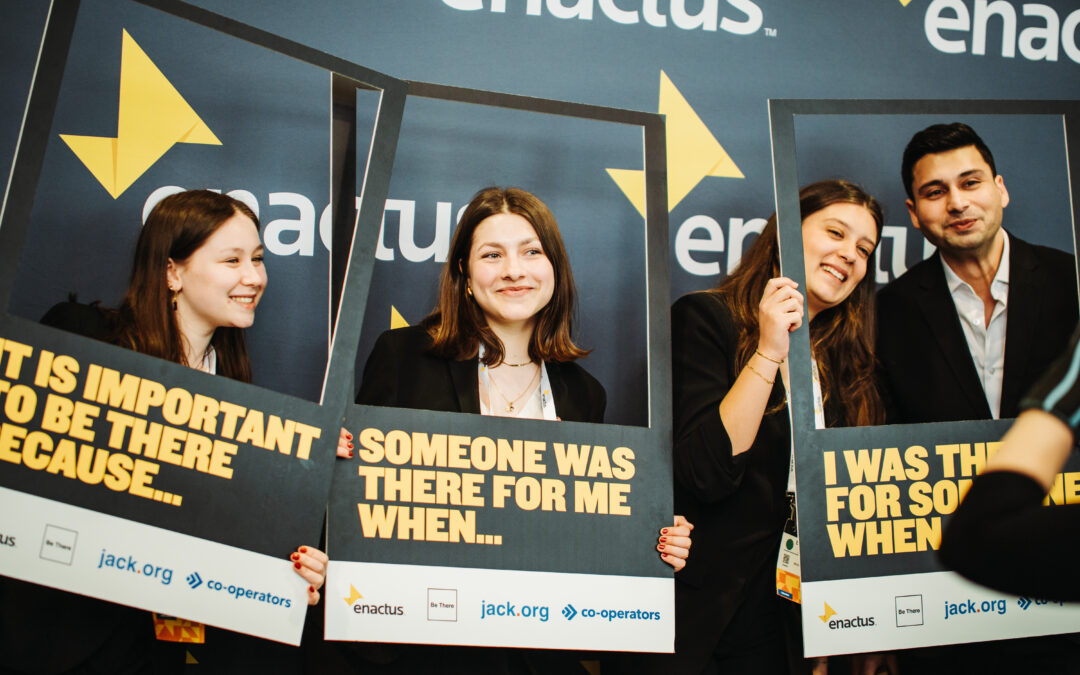Mental health challenges amongst young people are more pressing than ever, but there’s evidence that peer support can make all the difference. Did you know that the Public Health Agency of Canada reports that 70% of mental health-related issues emerge during childhood or adolescence? According to the Centre for Addiction and Mental Health, students aged 15–24 is the demographic most likely to experience mental illness or substance use disorders.
For the past three years, Enactus Canada, in partnership with Co-operators, has supported Enactus students through its Mental Health Ambassador (MHA) Program, an initiative designed to champion mental health across Enactus teams and beyond. Since the program’s inception, more than 50 students have been Ambassadors, improving mental health resilience through creativity, education, and peer-to-peer connections.
“The passion and creativity that has emerged from this group of ambassadors has been truly inspiring,” says Jessica Fisher, Senior Partnerships and Social Impact Consultant at Co-operators. “We have tapped into a significant need amongst youth and are supporting a growing network of Ambassadors to normalize mental health conversations and direct peers to help when needed. This program is having meaningful impact on the ground at a time when mental health supports are desperately needed.”

Jessica Fisher, Senior Partnerships and Social Impact Consultant at Co-operators and a student in the Mental Health Zone at the 2025 National Exposition.
What is the Mental Health Ambassador Program?
Leveraging resources from Jack.org’s “Be There” platform, the program provides training and support to a network of Enactus students in mental health education, promoting positive actions, and connecting peers with resources.
The Ambassadors action their learnings in their school community by organizing events, sharing resources, and looking out for the well-being of their teammates and school peers throughout the year.
Why This Program Matters
Young people often face barriers to accessing mental health support, with Mental Health Research Canada citing finances and stigma as significant barriers. The Mental Health Ambassador Program aims to bridge this gap by equipping ambassadors to:
- Educate: Deepen understanding of mental health issues and share resources
- Connect: Provide non-judgmental listening
- Activate: Host engaging events that foster community
“Being part of the MHA program reminded me how important it is to lead with kindness and compassion. Sometimes, the people who smile the most are the ones silently struggling and need extra support—whether from friends or professionals. As an MHA Ambassador, I was able to show up for others, be a supportive listener, advocate for mental health, and most importantly, help educate my team about the resources available on campus. For my team, simply knowing they could reach out to me was an extra layer of support—and that, in itself, was a meaningful gift,” says Sukhi Dhindsa, MHA from BCIT.
This year, a variety of initiatives and events were hosted to promote mental wellness in inclusive ways, including:
- Art Therapy Sessions
- Midterm Breakfast Buffet
- Mindfulness Mondays Drop in
- Paint Night
- Puppy Yoga
- Self-Care Social
- Stress Relief Walks
These events and initiatives have resulted in approximately 4,000 individuals being engaged in mental health programming and advocacy since the program launched three years ago.
“Being a Mental Health Ambassador opened my eyes to the importance of mental health in the workforce. Not only was I provided with the tools to improve my own mental health, but also the knowledge of how to properly support my colleagues and friends. I can confidently say, being a Mental Health Ambassador has been a truly rewarding experience,” says Evan Payne, MHA from Saint Mary’s University.


